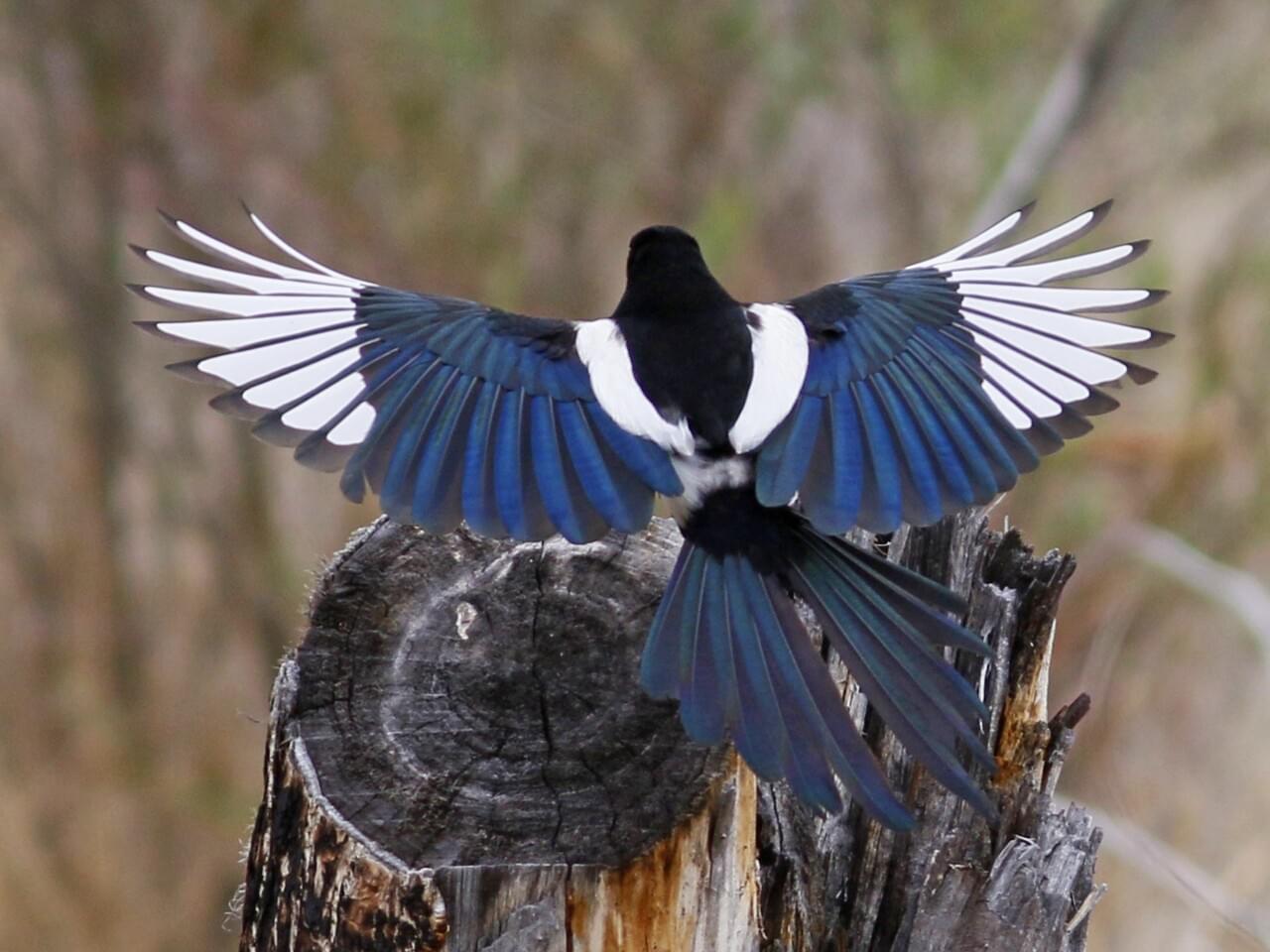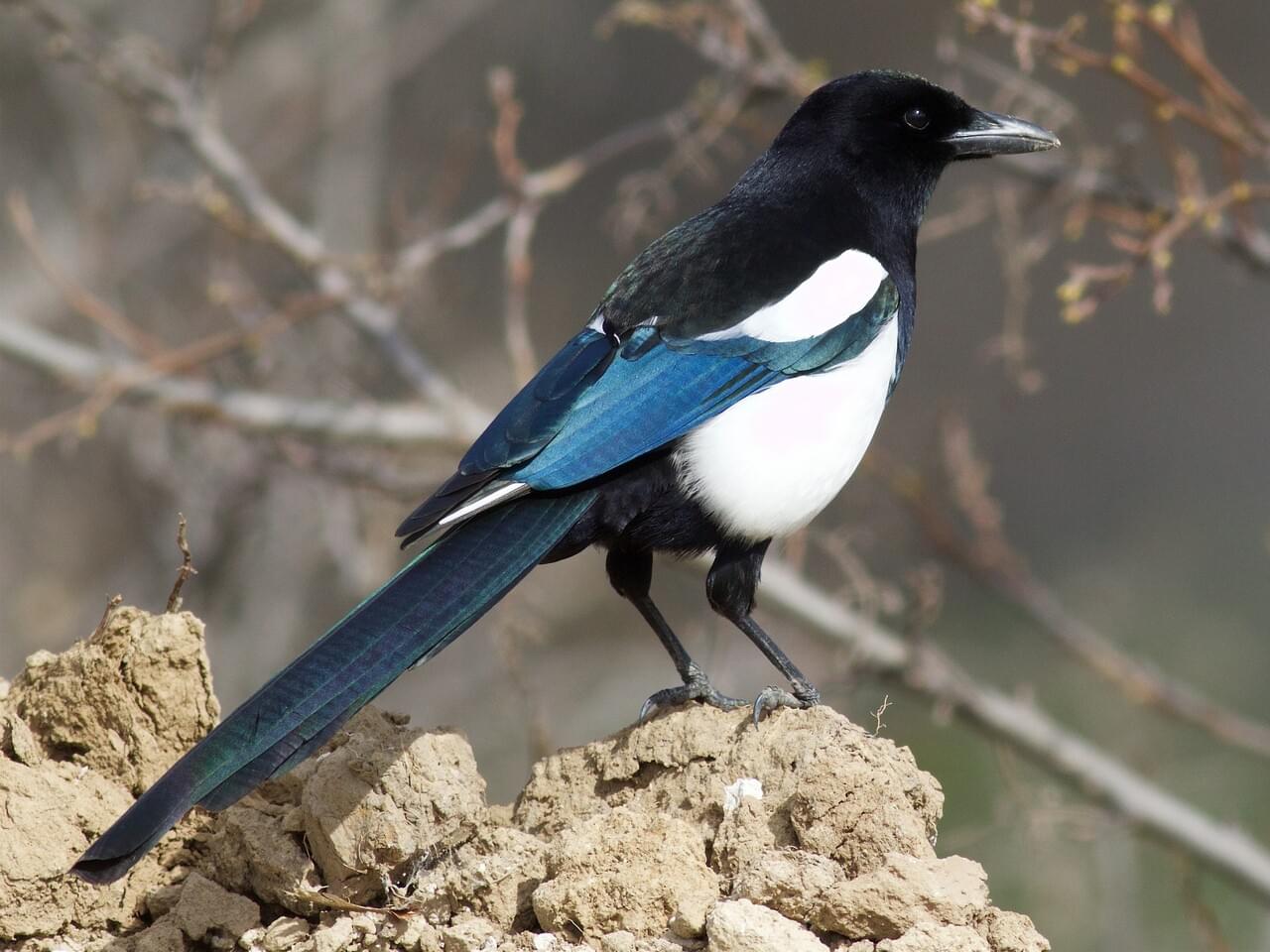 Photo ©
Mike Wisnicki
Photo ©
Mike Wisnicki
Black-billed Magpie
Regional Species
Black-billed Magpies are familiar and entertaining birds of western North America. They sit on fenceposts and road signs or flap across rangelands, their white wing patches flashing and their very long tails trailing behind them. This large, flashy relative of jays and crows is a social creature, gathering in numbers to feed at carrion. They’re also vocal birds and keep up a regular stream of raucous or querulous calls.
Range

Habitat
Black-billed Magpies live among the meadows, grasslands, and sagebrush plains of the West. Their nesting territories often follow stream courses. Though they like open areas and are not found in dense woods, they stay close to cover for protection from raptors. Magpies don’t avoid human development, often spending time near barnyards, livestock areas, and grain elevators where they have ready access to food.
Food
Like other corvids (members of the jay and crow family), Black-billed Magpies have a wide-ranging diet. They eat wild fruit and grain, as well as grasshoppers and beetles that they find while foraging on the ground (they sometimes find beetles by flipping cow dung). They also kill small mammals such as squirrels and voles, and raid birds’ nests. Carrion is also a main food source, as are the fly maggots found in carrion. Sometimes they steal meat from the kills of coyotes and foxes. Magpies also land atop large animals, such as cows or moose, and pick ticks off them. When they find an abundant food source, magpies will cache food for short periods.
Behavior
On the wing, Black-billed Magpies make long, sweeping flights with white flashes of their wing patches and long, trailing tails. They perch at the tops of trees, which is a means of visually establishing their territory, the equivalent of other bird species’ songs. Magpies walk with a swaggering strut. They sometimes gather in flocks, even seemingly living communally, and will band together to mob a raptor. In groups, males establish dominance through a stretch display: raising the bill in the air and flashing their white eyelids. They also show aggression with their wings, flickering or quivering them to display the white wing patches; and tails spreading, quivering, or flicking their elongated tail feathers. During courtship they also use a tail-spreading display. Black-billed Magpies mate for life. The female initiates the pair bond by begging for food from the male, which begins courtship feeding. During breeding, the male stands guard near the female to reduce the chance she’ll mate with another male (which does occur). One of the most notable Black-billed Magpie behaviors is the so-called “funeral”—when one magpie discovers a dead magpie, it begins calling loudly to attract other magpies. The gathering of raucously calling magpies (up to 40 birds have been observed) may last for 10 to 15 minutes before the birds disperse and fly off silently.
Nesting
Black-billed Magpie pairs share the work of building their domed nests, which vary widely in size but are typically about 30 inches high and 20 inches wide. The male gathers sticks for the exterior. The female tends to the interior, forming a mud cup and lining it with grass.
Appearance
Typical Sound
© Randolph Little | Macaulay Library
Size & Shape
Black-billed Magpies are slightly larger than jays with much longer, diamond-shaped tails and heavier bills. In flight, their wings seem to be too short to support their graceful flight.
Color Pattern
These birds are black and white overall with blue-green iridescent flashes in the wing and tail. The upperparts are mostly black with a white patch in the outer wing and two white stripes (“backpack straps”) on the back.
Plumage Photos
Similar Species
Yellow-billed Magpies are only found around the Central Valley of California; they have bright yellow bills. American Crows and Common Ravens also gather in large, social flocks like magpies, but those species are larger and all black, with shorter tails. Jays are smaller birds with much shorter tails than magpies, and most show some blue. Gray Jays are much smaller than magpies and are mostly gray, not black. Clark’s Nutcrackers are also mostly gray, with shorter tails and smaller white wing patches.
Did you know?!
- Historical records of the American West indicate that Black-billed Magpies have been associates of people for a long time. Magpies frequently followed hunting parties of Plains Indians and fed on leftovers from bison kills. On their expedition, Lewis and Clark reported magpies boldly entering their tents to steal food.
- The Black-billed Magpie frequently picks ticks from the backs of large mammals, such as deer and moose. The magpie eats the ticks or hides some for later use, as members of the crow and jay family often do with excess food. Most of the ticks, however, are cached alive and unharmed, and may live to reproduce later.
- Like most members of the jay family, the Black-billed Magpie is a nest predator, although eggs and nestlings make up only a tiny portion of the bird’s overall diet.




